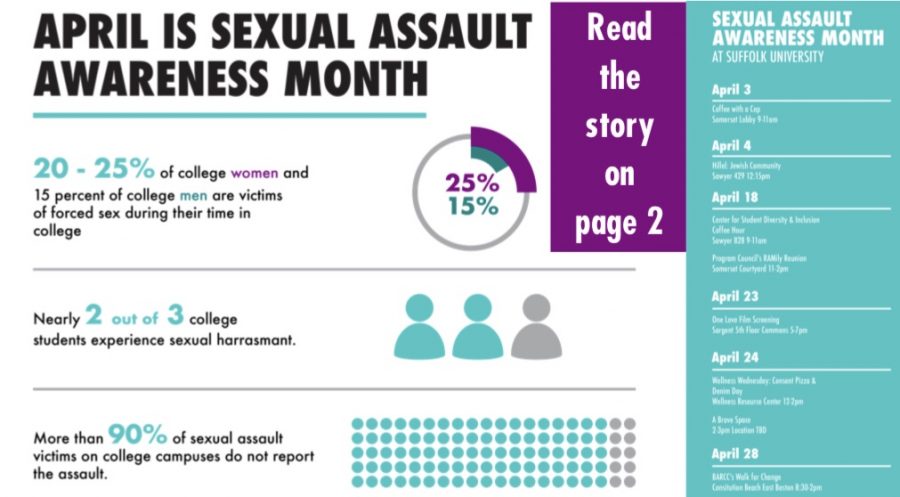Every year throughout the month of April, the National Sexual Violence Resource Center (NSVRC) coordinates a national campaign for Sexual Assault Awareness Month (SAAM). This campaign aims to educate and engage the public about sexual assault, according to the NSVRC’s website.
Concurrently, Massachusetts State Senator Michael O. Moore proposed legislation to address sexual violence on higher education campuses, according to the Massachusetts State Legislature’s website. The petition to introduce the legislation, Senate Bill 764, was introduced by Moore and sixteen other members of the Massachusetts Legislature.
The bill proposes changes to the way public and private universities investigate, report and prevent sexual assault incidents on their campuses. This legislation, if passed, will ensure colleges have a fair process for investigating these cases in order to protect both survivors and accused students.
Sheila Calkins is the Director of Title IX and Clery Act Compliance at Suffolk and believes that, if passed, this legislation will not have a significant impact on the way Suffolk handles cases of sexual violence.
“Right now, here at Suffolk we are pretty much doing exactly what the legislation has recommended. The most important thing about this however, is that there is legislation about it that is making sure universities are being consistent with how they handle sexual violence on their campuses,” said Calkins in an interview with The Suffolk Journal.
President Marisa Kelly said to The Journal that the university already has a strong sexual misconduct policy and many of the proposed requirements in the Senate bill have already been incorporated into Suffolk’s policy, including the areas of awareness, prevention, response and resources available to students who experience traumatic events related to sexual misconduct.
The bill proposes that all public and private universities “adopt a policy on dating violence, domestic violence, sexual assault and stalking that shall be made available, upon request, to an applicant, student or employee of the institution and shall be publicly available on the website in an accessible format,” according to the bill.
The bill goes on to outline what this policy should include. This includes procedures for reporting incidents, resources available for survivors including “contact information for seeking medical treatment,” rights of survivors to “notify or decline to notify law enforcement,” and “investigatory procedures and hearing procedures to protect the safety and rights of students…” according to the bill.
“We are familiar with the proposed legislation in the State House, and hope that any final legislation will reinforce our ability to support survivors and to ensure that we treat all parties fairly,” said Kelly in a statement to The Suffolk Journal.
A joint hearing with the Senate and House about the bill is scheduled for April 9.
Throughout April, a variety of events are being held across campus to educate the community and to raise awareness about this issue.
“With proper education, we can create change in our communities,” said Annie Crossman, assistant director of Wellness Education for Counseling, Health and Wellness (CHW) to The Journal. “We really believe that through education we can raise awareness and create change.”
The Interfaith Center will be holding multiple discussions regarding sexual assault and sexual abuse. Various SAAM tabling events will also be held throughout the month. On April 28 the Boston Area Rape Crisis Center (BARCC) will hold their annual Walk for Change to raise awareness about this issue.
“Awareness legitimizes sexual assault,” said Crossman to The Journal. “Making people aware about it and talking about it openly is absolutely crucial. People are targeted every minute and a half. If people aren’t made aware of this issue, nothing will ever change.”
These events are being sponsored by and in collaboration with departments across campus, including CHW, the Division of Student Affairs, Office of Title IX, Athletics, the Center for Student Diversity and Inclusion (CSDI), the Center for Women’s Health and Human Rights, the Interfaith Center, OCHO, Student Leadership and Involvement (SLI) and the Suffolk University Police Department (SUPD).
“You can tell this is something that the Suffolk community really cares about just by looking at how many different individuals and departments are getting involved in this month’s awareness activities,” said Crossman to The Journal. “There is a real commitment here in supporting survivors of sexual assault, but it is so important to make sure we are continuing to have conversations about this issue throughout the whole year, not just during the month of April.”




















